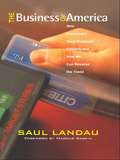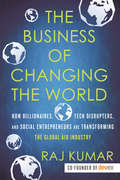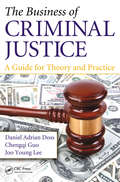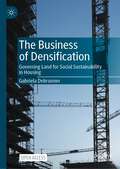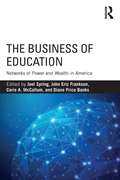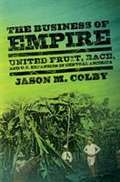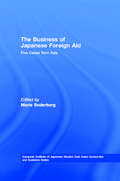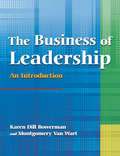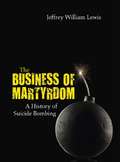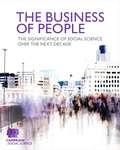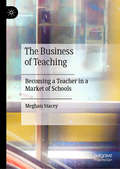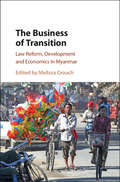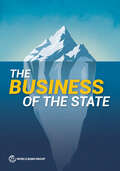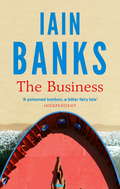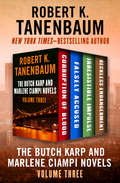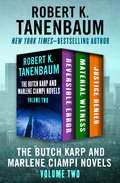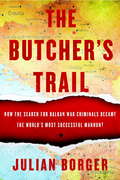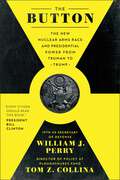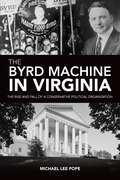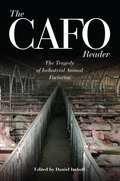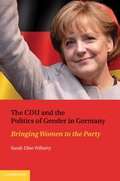- Table View
- List View
The Business of America: How Consumers Have Replaced Citizens and How We Can Reverse the Trend (Pathways Through the Twenty-First Century)
by Saul LandauFirst published in 2004. Routledge is an imprint of Taylor & Francis, an informa company.
The Business of Armaments: Armstrongs, Vickers and the International Arms Trade, 1855–1955
by Joanna SpearHow did Britain's most prominent armaments firms, Armstrongs and Vickers, build their businesses and sell armaments in Britain and overseas from 1855 to 1955? Joanna Spear presents a comparative analysis of these firms and considers the relationships they built with the British Government and foreign states. She reveals how the firms developed and utilized independent domestic strategies and foreign policies against the backdrop of imperial expansion and the two world wars. Using extensive new research, this study examines the challenges the two firms faced in making domestic and international sales including the British Government's commitment to laissez faire policies, prejudices within the British elite against those in trade, and departmental resistance to dealing with private firms. It shows the suite of strategies and tactics that the firms developed to overcome these obstacles to selling arms at home and abroad and how they built enduring relationships with states in Latin America, Asia, and the Middle East.
The Business of Changing the World: How Billionaires, Tech Disrupters, and Social Entrepreneurs Are Transforming the Global Aid Industry
by Raj KumarThe new world of results-driven aid that could put an end to extreme povertyDrawing on 2 decades covering global development as editor in chief of Devex, Raj Kumar explores how nontraditional models of philanthropy and aid are empowering the world's poorest people to make progress. Old aid was driven by good intentions and relied on big-budget projects from a few government aid agencies, like the World Bank and USAID. Today, corporations, Silicon Valley start-ups, and billionaire philanthropists are a disrupting force pushing global aid to be data driven and results oriented. This $200 billion industry includes emerging and established foundations like the Chan Zuckerberg Initiative and the Bill and Melinda Gates Foundation. Entrepreneurial startups like Hello Tractor, which offers an Uber-like app for farmers in Nigeria, and Give Directly, whose app allows individuals to send money straight to the phone of someone in need, are also giving rise to this new culture of charity. The result is a more sustainable philosophy of aid that elevates the voices of the world's poor as neighbors, partners, and customers.Refreshing and accessibly written, The Business of Changing the World sets forth a bold vision for how we can use our vote, our voice, and our wallet to turn well-intentioned charity into effective advocacy to transform the world for good. Businesspeople, policymakers, entrepreneurs, nonprofit executives, philanthropists, and aid workers around the world will all be influenced by this transformation.
The Business of Criminal Justice: A Guide for Theory and Practice
by Daniel Adrian Doss Chengqi Guo Joo Young LeeThis book represents the manifestation of a new presentation of old perspectives within the discipline of criminal justice. It contains practical considerations of rendering such decisions, it is expected to be an appropriate reference among practitioner personnel.
The Business of Densification: Governing Land for Social Sustainability in Housing
by Gabriela DebrunnerAffordable housing shortage and social exclusion have become severe societal problems across the globe. Increasing numbers of people are suffering from social eviction and displacement due to urban densification, modernization, rising rents, and intense housing commodification. Vulnerable resident groups – such as old-aged or households with children – who often live in old housing stocks planned to be densified, renovated, or upgraded with higher rents, are forced to leave the urban core centers because they can no longer afford to live in central locations, or because they experience unstable or insecure housing conditions. A scenario that is highly unsustainable.So far, studies on densification have mainly considered the process as technological, architectural, or design-based problem (e.g., Kyttä et al., 2013; Broitman & Koomen, 2015; Bibby et al., 2018). However, systematic knowledge on how to implement densification objectives sustainably – regarding economic, environmental, and social aspects – is still lacking. This book tackles this gap by analyzing densification from a governance perspective. Its point of departure is that densification per se does not necessarily lead to sustainable outcomes in terms of social inclusion, cohesion, or community stability. Rather, it politicizes densification by neglecting how the process is planned, implemented, and governed by the actors involved.The book applies an actors-centered neoinstitutionalist political ecology approach to reveal the specific objectives and strategies of actors involved, as well as the socio-political structures (i.e. rules. laws, and policies) that govern densification. Four Swiss in-depth empirical qualitative case studies (Zürich, Basel, Köniz, and Kloten) illustrate the political and legal conditions for success or failure for (un)sustainable implementations of densification. Ultimately, this book advises stakeholders, governments, urban practitioners, and academics on more effective, community-oriented, collective, and decommodified forms of governance to respond to the needs of the public at large rather than simply catering to private individuals and firms. Such governance initiatives entail active municipal land policy approaches outside a purely market-based investment logic that not only limit, but also work with property rights.This is an open access book.
The Business of Education: Networks of Power and Wealth in America (Sociocultural, Political, and Historical Studies in Education)
by Joel Spring Corie A. Mccallum Diane Price Banks John Eric FranksonThe Business of Education—a comprehensive view of how education policy is made in the US and, in some cases, globally—analyzes and critiques the influence of educational policy networks in a wide range of contexts and from a variety of perspectives, including testing, college preparation, juvenile detention centers, special education, the arts, teacher evaluation systems, education of undocumented immigrants, college faculty preparation, and financial aid. A network chart in most chapters illustrates how the major political actors, mainly private philanthropic foundations, for-profit companies, government officials, and politicians involved in the network, are linked. Joel Spring, internationally renowned scholar and analyst of educational policy, situates and frames the network studies in an introduction discussing general theories of education policy networks.
The Business of Empire: United Fruit, Race, and U. S. Expansion in Central America
by Jason M. ColbyThe link between private corporations and U.S. world power has a much longer history than most people realize. Transnational firms such as the United Fruit Company represent an earlier stage of the economic and cultural globalization now taking place throughout the world. Drawing on a wide range of archival sources in the United States, Great Britain, Costa Rica, and Guatemala, Colby combines "top-down" and "bottom-up" approaches to provide new insight into the role of transnational capital, labor migration, and racial nationalism in shaping U.S. expansion into Central America and the greater Caribbean. The Business of Empire places corporate power and local context at the heart of U.S. imperial history. In the early twentieth century, U.S. influence in Central America came primarily in the form of private enterprise, above all United Fruit. Founded amid the U.S. leap into overseas empire, the company initially depended upon British West Indian laborers. When its black workforce resisted white American authority, the firm adopted a strategy of labor division by recruiting Hispanic migrants. This labor system drew the company into increased conflict with its host nations, as Central American nationalists denounced not only U.S. military interventions in the region but also American employment of black immigrants. By the 1930s, just as Washington renounced military intervention in Latin America, United Fruit pursued its own Good Neighbor Policy, which brought a reduction in its corporate colonial power and a ban on the hiring of black immigrants. The end of the company's system of labor division in turn pointed the way to the transformation of United Fruit as well as the broader U.S. empire.
The Business of Japanese Foreign Aid: Five Cases from Asia (European Institute of Japanese Studies East Asian Economics and Business Series)
by Marie SöderbergJapan is now the biggest donor of Official Development Assistance (ODA) throughout the world. This study takes a new approach to this subject by focusing on the procedures, methodologies and business mechanisms at the implementation level that influence the process of policy-making in Tokyo. It is also the first study to explore the process of receiving aid, arguing that many of the recipient countries exert considerable influence over the distribution of Japanese foreign aid.
The Business of Leadership: An Introduction
by Montgomery Van Wart Karen Dill BowermanSpecifically tailored to business students, this undergraduate textbook features a "how-to" approach and is filled with with current, lively examples and well-crafted learning tools. It takes readers from the kind of leradership they can exhibit in supervisory roles to the visionary leadership they must exhibit in management and executive roles.
The Business of Martyrdom
by Jeffrey William LewisThe Business of Martyrdom is the only comprehensive history of suicide bombing from its origins in Imperial Russia to the present day. It makes use of a framework from the history and philosophy of technology to explain the diffusion and evolution of suicide bombing over the past several decades. It is primarily a work of synthesis meant to reach a broad audience and endeavors to integrate as much of the recent scholarly literature as possible, including reconciling explanatory mechanisms that seem to be at odds with one another. In addition, this book is able to draw on very recent changes in suicide bombing in the years 2008-2010 that allow it to have a slightly different perspective than earlier studies. For the first time the global number of suicide attacks has declined significantly for three years in a row. This book therefore has the advantage of addressing the phenomenon of suicide bombing as a bounded phenomenon with limits to its growth and diffusion. To this point the impression that suicide bombers are the smartest bombs yet created has been widespread but confined to the area of metaphor. Drawing well-established ideas from the history of technology, The Business of Martyrdom argues that the metaphor should be taken literally. Suicide bombing is a technology that has been invented and re-invented at different times in different areas but always for the same purpose: resolving a mismatch in military capabilities between antagonists by utilizing the available cultural and human resources. Over the past several years, analysts have produced a large number of monographs and articles examining suicide bombing. The best contributions in this new and growing literature have shed considerable light on the complexity of suicide bombing in practice, particularly regarding the structure of the organizations that deploy suicide bombers and the relationships between these organizations and the recruits whom they utilize in their attacks. Nevertheless, nagging inconsistencies and questions remain. These inconsistencies can be explained by examining suicide bombing as a technological system that integrates human beings, cultures, and devices and directs them toward specific ends. Such an analysis requires that neither the individual bombers nor their sponsoring organizations be the basic unit of discussion. Instead, the bombers must be understood as components within a much larger system that has been shaped by a host of social, cultural, and operational constraints throughout its existence. Integrating insights from the historical analysis of other technological systems with the recent literature specifically devoted to suicide bombing therefore allows The Business of Martyrdom to develop a fuller understanding of suicide bombing as a unified yet diverse phenomenon
The Business of People: The significance of social science over the next decade
by Campaign for Social ScienceTackling infectious disease, understanding radicalisation, improving productivity, siting new airport capacity, getting people to save for retirement - nearly all the issues facing the UK now and in the near future demand the urgent attention of those trained to study human processes. In short, we need sharp social science now more than ever. The Business of People looks at the backdrop to the UK elections taking place in May 2015 to argue that we need to invest in science and innovation - not just for the sake of 'UK plc' and prospects for growth and economic recovery, but to inform debate and policymaking on migration, housing, devolution of power within the UK, and the UK's position in Europe. The report sets out the need for new economic and social knowledge and illustrates the many ways in which social scientists are contributing to changing practice and deepening knowledge. It outlines the size and structure of UK social science, its contribution to GDP, how social science graduates are essential to the work of firms, government and the third sector. The report ends with a set of recommendations for the next few years - urgent reading for the next government - on research funding, social science capacity and the use of expert advice by government. An open access electronic version of the report is downloadable from http://campaignforsocialscience. org. uk/businessofpeople/
The Business of Teaching: Becoming a Teacher in a Market of Schools
by Meghan StaceyThis book explores the experiences of early career teachers in a profession that has become highly stratified by market processes. The author presents New South Wales, Australia as a case study: a state with a long history of academically selective and private sector schooling, which has become increasingly segregated under a series of neoliberalised policy reforms since the 1980s. The experiences of teachers in this book are rich and varied, from a variety of different contexts – ranging from public schools enrolling students experiencing significant educational disadvantage to elite independent schools serving much more advantaged student cohorts. Highlighting teachers’ experiences in themselves rather than their impact on students, this timely book will be of interest and value to scholars of sociology of education, teachers’ work and education policy.
The Business of Transition: Law Reform, Development and Economics in Myanmar
by Melissa CrouchThis interdisciplinary volume offers a timely reflection on law, development and economics through empirical and comparative perspectives on contemporary Myanmar. The book explores the business that takes place in times of major political change through law and development initiatives and foreign investment. The expert contributors to this volume identify the ways in which law reform creates new markets, embodies hopes of social transformation and is animated by economic gain. This book is an invitation to think carefully and critically about the intersection between law, development and economics in times of political transition. The chapters speak to a range of common issues - land rights, access to finance, economic development, the role of law including its potential and its limits, and the intersection between local actors, globalised ideas and the international community. This interdisciplinary book is for students, scholars and practitioners of law and development, Asian studies, political science and international relations.
The Business of the State: Why Going Beyond State-owned Enterprises Matters For Private Sector Development
by World BankThe state, as an owner of businesses, competes and collaborates with the private sector, and this involvement has profound implications for investment and growth. Governments actively participate in commercial markets in different forms, from controlling the production of goods and services to investing in firms as a minority shareholder. The impact of state participation on an economy's growth depends on the type of public-private ownership, the types of markets, and the importance of those markets in the economy. The impact also depends on how policies and institutions regulate both the businesses with state ownership and the markets in which they are active. The Business of the State uses new evidence covering 91 countries from the World Bank's Global Businesses of the State database to highlight the distinction between businesses of the state and traditionally understood state-owned enterprises. The report analyzes how different ownership forms across sectors and institutional settings affect private investment, productivity, technology adoption, and job creation. It also analyzes how government participation in markets influences the ability of economies to respond to shocks, from pandemics to climate change. The report proposes a clear analytical framework for understanding the consequences of relying on businesses of the state to attain specific development goals.
The Business: A Novel
by Iain BanksKate Telman is a senior executive officer in The Business, a powerful and massively discreet transglobal organisation. Financially transparent, internally democratic and disavowing conventional familial inheritance, the character of The Business seems, even to Kate, to be vague to the point of invisibility. It possesses, allegedly, a book of Leonardo cartoons, several sets of Crown Jewels and wants to buy its own State in order to acquire a seat at the United Nations.Kate's job is to keep abreast of current technological developments and her global reach encompasses Silicon Valley, a ranch in Nebraska, the firm's secretive Swiss headquarters, and a remote Himalayan principality. In the course of her journey Kate must peel away layers of emotional insulation and the assumptions of a lifetime. She must learn to keep her world at arm's length. To take control, she has to do The Business.
The Butch Karp and Marlene Ciampi Novels Volume Three: Corruption of Blood, Falsely Accused, Irresistible Impulse, and Reckless Endangerment (Butch Karp and Marlene Ciampi)
by Robert K. TanenbaumFour razor-sharp thrillers in the long-running series from a New York Times–bestselling author—and “one hell of a writer” (New York Post). Proclaimed the “Joseph Wambaugh of the judicial system” by the San Diego Tribune, trial lawyer Robert K. Tanenbaum crafts his legal thrillers with authenticity and breath-taking suspense. In these four entries in the series, Manhattan assistant district attorney Roger “Butch” Karp and Marlene Ciampi fight the good fight against crime and an often-corrupt judicial system with energy, wit, and a passion for the truth (New York Post). Corruption of Blood: Butch has just found evidence that could prove who really killed JFK, and he’s about to find out that the conspiracy behind the assassination is still alive—and still deadly . . . “[His] most enthralling legal thriller to date.” —Vincent Bugliosi Falsely Accused: When New York’s chief medical examiner is wrongly fired, he goes to Karp for justice—only for Butch to discover corruption far deadlier than he’s ever seen . . . “[An] “electrifying page-turner.” —Kirkus Reviews Irresistible Impulse: A racially charged murder pits Butch against a flashy defense lawyer in a case so divisive it could drive the city to tear itself apart . . . “The suspense here is Hitchcockian.” —Publishers Weekly Reckless Endangerment: Drug kingpins are being murdered all over Manhattan, and Butch must help the police find a vigilante who has more in mind than justice . . . “A three-ring circus of mayhem and mystery.” —Publishers Weekly
The Butch Karp and Marlene Ciampi Novels Volume Two: Reversible Error, Material Witness, and Justice Denied (Butch Karp and Marlene Ciampi)
by Robert K. TanenbaumThree pulse-pounding thrillers in the long-running series from the New York Times–bestselling author and “Joseph Wambaugh of the judicial system” (San Diego Tribune). A successful trial lawyer and “one hell of a writer,” Robert K. Tanenbaum crafts his legal thrillers with authenticity and breath-taking suspense. Here are three books in his series featuring Manhattan assistant district attorney Roger “Butch” Karp, who struggles against an often-corrupt judicial system. But with the help of Marlene Ciampi, he fights the good fight with energy, wit, and a passion for the truth (New York Post). Reversible Error: When a group of politicians back his bid for Manhattan’s district attorney, Butch soon realizes that his benefactors have their own sinister motives . . . “Sizzles and explodes . . . a gut-wrencher that takes Tanenbaum to the summit!” —Booklist Material Witness: When a star basketball player is found murdered with a huge stash of cocaine, Butch must go undercover to stop a conspiracy of drugs, gambling, and murder . . . “[A] witty, highly intricate big-city police thriller.” —USA Today Justice Denied: After a Turkish diplomat is gunned down in the street, Butch and Marlene are caught in a deadly web of corruption more sinister than even he could have imagined . . . “[A] gritty tale of intrigue.” —Chicago Tribune
The Butcher's Trail
by Julian BorgerThe gripping, untold story of The International Criminal Tribunal for the former Yugoslavia and how the perpetrators of Balkan war crimes were captured by the most successful manhunt in historyWritten with a thrilling narrative pull, The Butcher's Trail chronicles the pursuit and capture of the Balkan war criminals indicted by the International Criminal Tribunal in The Hague. Borger recounts how Radovan Karad ić and Ratko Mladić--both now on trial in The Hague--were finally tracked down, and describes the intrigue behind the arrest of Slobodan Milosevic, the Yugoslav president who became the first head of state to stand before an international tribunal for crimes perpetrated in a time of war. Based on interviews with former special forces soldiers, intelligence officials, and investigators from a dozen countries--most speaking about their involvement for the first time--this book reconstructs a fourteen-year manhunt carried out almost entirely in secret. Indicting the worst war criminals that Europe had known since the Nazi era, the ICTY ultimately accounted for all 161 suspects on its wanted list, a feat never before achieved in political and military history.
The Butterfly Defect: How Globalization Creates Systemic Risks, and What to Do about It
by Ian Goldin Mike MariathasanHow to better manage systemic risks—from cyber attacks and pandemics to financial crises and climate change—in a globalized worldThe Butterfly Defect addresses the widening gap between the new systemic risks generated by globalization and their effective management. It shows how the dynamics of turbo-charged globalization has the potential and power to destabilize our societies. Drawing on the latest insights from a wide variety of disciplines, Ian Goldin and Mike Mariathasan provide practical guidance for how governments, businesses, and individuals can better manage globalization and risk.Goldin and Mariathasan demonstrate that systemic risk issues are now endemic everywhere—in supply chains, pandemics, infrastructure, ecology and climate change, economics, and politics. Unless we address these concerns, they will lead to greater protectionism, xenophobia, nationalism, and, inevitably, deglobalization, rising inequality, conflict, and slower growth.The Butterfly Defect shows that mitigating uncertainty and risk in an interconnected world is an essential task for our future.
The Button: The New Nuclear Arms Race and Presidential Power from Truman to Trump
by William J. Perry Tom Z. CollinaThe President has the power to end the world in minutes. Right now, no one can stop him. Since the Truman administration, America has been one "push of a button" away from nuclear war—a decision that rests solely in the hands of the President. Without waiting for approval from Congress or even the Secretary of Defense, the President can unleash America's entire nuclear arsenal. Almost every governmental process is subject to institutional checks and balances. Why is potential nuclear annihilation the exception to the rule? For decades, glitches and slip-ups have threatened to trigger nuclear winter: misinformation, false alarms, hacked warning systems, or even an unstable President. And a new nuclear arms race has begun, threatening us all. At the height of the Cold War, Russia and the United States each built up arsenals exceeding 30,000 nuclear weapons, armed and ready to destroy each other—despite the fact that just a few hundred are necessary to end life on earth. From authors William J. Perry, Secretary of Defense in the Clinton administration and Undersecretary of Defense for Research and Engineering in the Carter administration, and Tom Z. Collina, the Director of Policy at Ploughshares Fund, a global security foundation in Washington, DC, The Button recounts the terrifying history of nuclear launch authority, from the faulty 46-cent microchip that nearly caused World War III to President Trump's tweet about his "much bigger & more powerful" button. Perry and Collina share their firsthand experience on the front lines of the nation's nuclear history and provide illuminating interviews with former President Bill Clinton, former Secretary of Defense Jim Mattis, Congressman Adam Smith, Nobel Peace Prize winner Beatrice Fihn, senior Obama administration officials, and many others. Written in an accessible and authoritative voice, The Button reveals the shocking tales and sobering facts of nuclear executive authority throughout the atomic age, delivering a powerful condemnation against ever leaving explosive power this devastating under any one person's thumb.
The Byrd Machine in Virginia: The Rise and Fall of a Conservative Political Organization
by Michael Lee PopeThe Byrd Machine ran Virginia politics for more than half a century.This political organization rose to power during the era of Jim Crow, wielding power and influence over everything from who got the nod to be governor to how the state maintained racial segregation. Inheriting its tactics from two previous political machines, the Byrd organization operated with a pathological hatred of debt spending, crushing the power of labor unions and forcing its will on Black schoolchildren protesting separate and unequal facilities. The nadir of its era was massive resistance, a move to close public schools rather than integrate them. Journalist and author Michael Lee Pope details the rise and fall of the last great political machine in Virginia.
The Byzantine Republic: People and Power in New Rome
by Anthony KaldellisScholars have long claimed that the Eastern Roman Empire, a Christian theocracy, bore little resemblance to ancient Rome. Here, Anthony Kaldellis reconnects Byzantium to its Roman roots, arguing that it was essentially a republic, with power exercised on behalf of, and sometimes by, Greek-speaking citizens who considered themselves fully Roman.
The CAFO Reader
by Daniel ImhoffThe CAFO Reader is possibly the most powerful indictment of factory farming ever compiled, with essays from 30 of the world's leading experts. It also offers a vision for a food system that leaves behind the horrific 20th century model of Concentrated Animal Feeding Operations.The CAFO Reader brings the tragic world of industrial food production into sharp focus with essays on every facet of factory farming: health, environment, animal welfare, labor, politics, economics, and so on. This affordable reader is a companion book to the larger photo-essay volume, CAFO: The Tragedy of Industrial Animal Factories. It is sure to become a relied-upon resource for activists, food policy makers, academics, the media and the general public for many years. This project is a follow-up to the highly successful project Fatal Harvest, published in 2002. It is being supported by an extensive outreach campaign with events around the country.
The CAFO Reader
by Daniel ImhoffThe CAFO Reader is possibly the most powerful indictment of factory farming ever compiled, with essays from 30 of the world's leading experts. It also offers a vision for a food system that leaves behind the horrific 20th century model of Concentrated Animal Feeding Operations.The CAFO Reader brings the tragic world of industrial food production into sharp focus with essays on every facet of factory farming: health, environment, animal welfare, labor, politics, economics, and so on. This affordable reader is a companion book to the larger photo-essay volume, CAFO: The Tragedy of Industrial Animal Factories. It is sure to become a relied-upon resource for activists, food policy makers, academics, the media and the general public for many years. This project is a follow-up to the highly successful project Fatal Harvest, published in 2002. It is being supported by an extensive outreach campaign with events around the country.
The CDU and the Politics of Gender in Germany
by Sarah Elise WiliartyThis book develops the concept of the corporatist catch-all party to explain how the German Christian Democratic Union (CDU) has responded to changing demands from women over the past forty years. Otto Kirchheimer's classic study argues that when catch-all parties reach out to new constituencies, they are forced to decrease the involvement of membership to facilitate doctrinal flexibility. In a corporatist catch-all party, however, societal interests are represented within the party organization and policy making is the result of internal party negotiation. Through an investigation of CDU policy making in the issue areas of abortion policy, work-family policy, and participation policy, this book demonstrates that sometimes the CDU mobilizes rather than disempowers membership. An important lesson of this study is that a political party need not sacrifice internal democracy and ignore its members in order to succeed at the polls.
